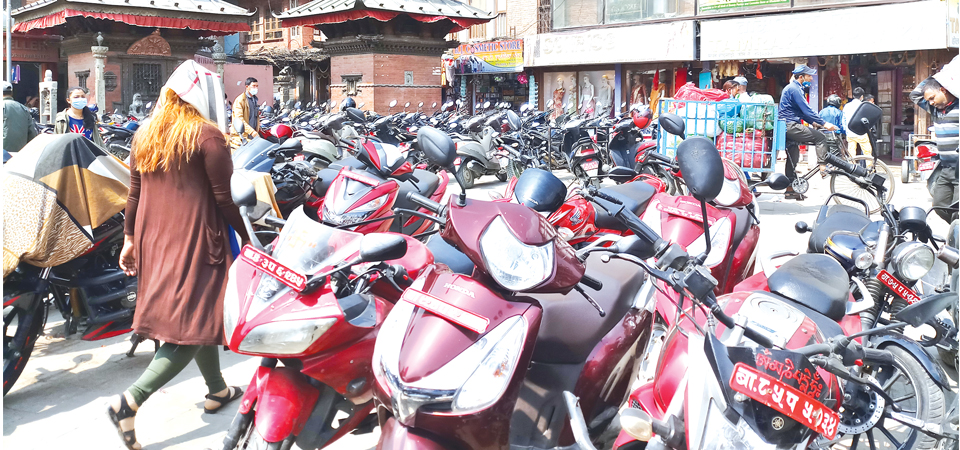Culture hampered as residents move out of Kathmandu core

By Aashish Mishra
Kathmandu, Mar. 17: Tejindra Shrestha looks at Wotu now and finds it very different from the place he grew up in. The 64-year-old who currently lives in Thapagaun, visits his ancestral home in this core Newar community northeast of Hanumandhoka every week to check on his house.
“The tole has lost its life,” he claimed. Rather an odd thing to say about an area that is one of the busiest streets in Kathmandu and is always bustling with people. “That is a hollow vibrancy because none of the people you see around live here,” Shrestha explained. “Almost all of Wotu’s original inhabitants have moved elsewhere.”
And with the people gone, the local “atmosphere” has also disappeared, Shrestha said. “We used to sit for feasts around Wotu Dewal to mark special occasions. Indra Jatra and Pāhān Charhe used to create such glee. Now, the fervour has vanished because there is no one around to celebrate,” he lamented.
It is a similar story in Makhan. Nemkul Sthapit, a resident, recalled how every other week, local Bajracharyas would gather on the premises of the Ratnakirti Mahavihar and hold elaborate worship ceremonies.
But as the area commercialised, many sold or rented out their properties to Marwadis and moved elsewhere. “Once away, many Bajracharyas did not or could not come frequently to conduct the pujas and the tradition gradually died down.”
Sthapit believed that migration had taken the soul out of the area. “Just look at the condition of Makhan Bahal. It has turned into a parking lot. I don’t think the newer residents even know that it is called Makhan Bahal!”
The impact of out-migration has had on local culture is also clear at Bagbazaar. “This commercial hub was once a centre for many Guthis,” said local Upendra Awasthi, 45. Awasthi remembers hearing stories from his parents and grandparents that many Guthis of Kathmandu used to have houses in Bagbazaar and used to come to perform various rituals. “When I was a little boy, I used to see musical processions for Bratabandha, Gufa or old-age Janku ceremonies.”
“Alas, the native residents and Guthis sold their property to businesses and the traditions that gave this place life became a distant memory,” Awasthi said.
The trend of locals moving out of their native communities is occurring in the Newar settlements all over the valley, driven mainly by real estate prices and the desire to live in a more open space, according to real estate agent Ajil Maharjan. “Development turned many residential areas into commercial centres. This drove property prices up and it became more profitable to sell or rent out a house than live in it,” he said, adding, “Also, many wanted to live in more open areas with enough space for their vehicles and less risk during calamities like earthquakes.”
Such exodus has a significant impact on culture, and not for the better, stated Bhai Ram Khadgi, chairman of Kathmandu Metropolitan City ward no. 28 which includes Bagbazaar. “Non-natives often do not have knowledge of the local culture and cannot carry on traditions that may be centuries old,” he told The Rising Nepal. “In extreme cases, this might kill customs altogether.”
Khadgi informed that the local levels could ensure that some rituals survived by taking their responsibility or supporting people to perform them. “But there’s only so much we can do. As times change, situations change and residential areas become commercial. We cannot do anything,” he remarked.
Meanwhile, in 2019, Bhaktapur Municipality had passed a local act for the protection and promotion of art, culture and heritage. Article 6 (5) of the act states that the municipality can prohibit non-locals from purchasing property within the areas declared as cultural zones.
The objective of the act, as declared by the municipality, was to preserve local art, culture, tradition and heritage. However, the Supreme Court issued an interim order on January 1 to not implement that provision of the act citing it contradicted with Article 25 Right to Property and Article 37 Right to Housing of the Constitution of Nepal.
Recent News

Do not make expressions casting dout on election: EC
14 Apr, 2022
CM Bhatta says may New Year 2079 BS inspire positive thinking
14 Apr, 2022
Three new cases, 44 recoveries in 24 hours
14 Apr, 2022
689 climbers of 84 teams so far acquire permits for climbing various peaks this spring season
14 Apr, 2022
How the rising cost of living crisis is impacting Nepal
14 Apr, 2022
US military confirms an interstellar meteor collided with Earth
14 Apr, 2022
Valneva Covid vaccine approved for use in UK
14 Apr, 2022
Chair Prachanda highlights need of unity among Maoist, Communist forces
14 Apr, 2022
Ranbir Kapoor and Alia Bhatt: Bollywood toasts star couple on wedding
14 Apr, 2022
President Bhandari confers decorations (Photo Feature)
14 Apr, 2022









